道德经 中英文对照
老子道德经中英译文对照

老子道德经中英译文对照以下是为您生成的《老子道德经》的部分译文:原文:道可道,非常道;名可名,非常名。
无名,天地之始;有名,万物之母。
译文:这“道”要是能说得清楚,那就不是真正的“道”啦;这“名”要是能叫得出来,那就不是真正的“名”喽。
啥都没有的时候,那是天地开始的时候;有了名儿,才有了万物的老祖宗。
您想想啊,咱平时过日子,好多事儿都说不清道不明的,就像这“道”一样。
它太玄乎啦,不是咱三两句话能说明白的。
“名”也是,有些东西的名字,你叫出来也不一定就是它真正的样子。
天地一开始的时候,啥都没有,空空荡荡的。
后来有了名儿,这才有了各种各样的东西。
这可是出自老子的《道德经》哦!原文:故常无欲,以观其妙;常有欲,以观其徼。
译文:所以呢,经常啥欲望都没有,就能看到这世界神奇的地方;经常有欲望呢,就能看到这世界的边界。
您瞅瞅,要是咱心里没啥想法,没啥欲望,就能发现好多平常发现不了的好玩意儿。
可要是心里老是惦记着这惦记着那,有各种欲望,那就只能看到一些表面的、有限的东西啦。
就好比您去旅游,要是心无杂念,说不定能看到别人看不到的美景;要是一心就想着拍照发朋友圈,可能就错过了很多真正美的瞬间。
这也是《道德经》里说的哟!原文:此两者,同出而异名,同谓之玄。
玄之又玄,众妙之门。
译文:这两种情况,都是从一个地方出来的,就是名字不一样,都叫做玄乎。
玄乎得不得了,那就是好多神奇事情的大门。
您说这多有意思,其实没啥欲望和有欲望,本质上差不多,就是说法不同。
这玄乎的事儿啊,越琢磨越玄乎,可这里面就藏着好多奇妙的道理。
就像一扇大门,您要是能打开,就能看到好多让您惊讶的东西。
这同样出自《道德经》呀!。
《道德经》汉英对照Waley译本

Long and shorttestone another;
Highandlowdetermineoneanother.
Pitchandmode giveharmonytoone another.
Frontandbackgive sequence to one another.
There will be no more thieves.
Ifthe peoplenever see suchthings asexcite desire,
Theirhearts willremainplacid andundisturbed.
Thereforethe Sage rules
By emptyingtheir hearts
If we stoplookingfor“persons of superior morality” (hsien) to putin power,
There willbenomorejealousies among thepeople.
Ifweceaseto setstoreby products thatare hard to get,
Therefore theSage reliesonactionlessactivity,
Carriesonwordless teaching,
But themyriad creaturesare workedupon byhim;
Hedoes notdisownthem.
He rearsthem,butdoesnotlay claimtothem,
Controls them,but doesnot leanuponthem,
老子道德经英文全文版
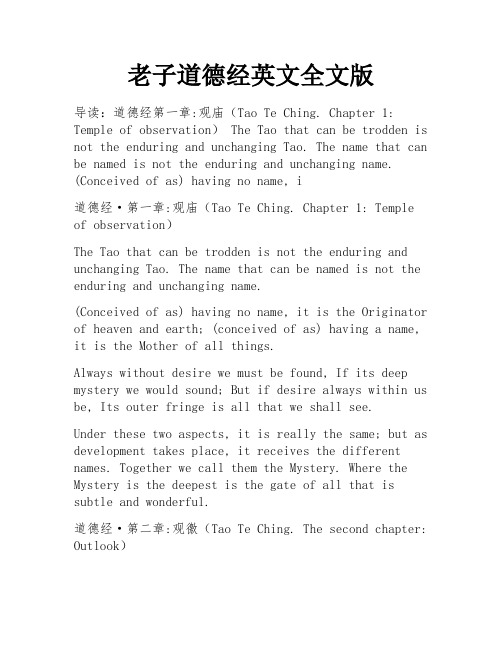
老子道德经英文全文版导读:道德经第一章:观庙(Tao Te Ching. Chapter 1: Temple of observation) The Tao that can be trodden is not the enduring and unchanging Tao. The name that can be named is not the enduring and unchanging name. (Conceived of as) having no name, i道德经·第一章:观庙(Tao Te Ching. Chapter 1: Temple of observation)The Tao that can be trodden is not the enduring and unchanging Tao. The name that can be named is not the enduring and unchanging name.(Conceived of as) having no name, it is the Originator of heaven and earth; (conceived of as) having a name, it is the Mother of all things.Always without desire we must be found, If its deep mystery we would sound; But if desire always within us be, Its outer fringe is all that we shall see.Under these two aspects, it is really the same; but as development takes place, it receives the different names. Together we call them the Mystery. Where the Mystery is the deepest is the gate of all that is subtle and wonderful.道德经·第二章:观徼(Tao Te Ching. The second chapter: Outlook)All in the world know the beauty of the beautiful, and in doing thisthey have (the idea of) what ugliness is; they all know the skill of the skilful, and in doing this they have (the idea of) what the want of skill is.So it is that existence and non-existence give birth the one to (the idea of) the other; that difficulty and ease produce the one (the idea of) the other; that length and shortness fashion out the one the figure of the other; that (the ideas of) height and lownessarise from the contrast of the one with the other;that the musical notes and tones bee harmonious through the relation of one with another; and that being before and behind give the idea of one following another.Therefore the sage manages affairs without doing anything, and conveys his instructions without the use of speech.All things spring up, and there is not one which declines to show itself; they grow, and there is no claim made for their ownership; they go through their processes, and there is no expectation (of a rewardfor the results). The work is acplished, and there is no resting in it (as an achievement).The work is done, but how no one can see; 'Tis this that makes the power not cease to be.道德经·第三章:安民(Tao Te Ching. The third chapter: Peace)Not to value and employ men of superior ability is the way to keep the people from rivalry among themselves; not to prize articles which are difficult to procureis the way to keep them from being thieves; not to show them what is likely to excite their desires isthe way to keep their minds from disorder.Therefore the sage, in the exercise of his government, empties theirminds, fills their bellies, weakens their wills, and strengthens their bones.He constantly (tries to) keep them without knowledge and without desire, and where there are those who have knowledge, to keep them from presuming to act (on it). When there is this abstinence from action, good orderis universal.道德经·第四章:不盈(Tao Te Ching. The fourth chapter: inefficiency)The Tao is (like) the emptiness of a vessel; and inour employment of it we must be on our guard againstall fulness. How deep and unfathomable it is, as if it were the Honoured Ancestor of all things!We should blunt our sharp points, and unravel the plications of things; we should attemper our brightness, and bring ourselves into agreement withthe obscurity of others. How pure and still the Tao is, as if it would ever so continue!I do not know whose son it is. It might appear to have been before God.道德经·第五章:守中(Tao Te Ching. The fifth chapter: Guarding)Heaven and earth do not act from (the impulse of) any wish to be benevolent; they deal with all things asthe dogs of grass are dealt with. The sages do not act from (any wish to be) benevolent; they deal with the people as the dogs of grass are dealt with.May not the space between heaven and earth be pared to a bellows?'Tis emptied, yet it loses not its power;'Tis moved again, and sends forth air the more. Much speech to swift exhaustion lead we see; Your inner being guard, and keep it free.道德经·第六章:谷神(Tao Te Ching. The sixth chapter: Cereal God)The valley spirit dies not, aye the same;The female mystery thus do we name.Its gate, from which at first they issued forth,Is called the root from which grew heaven and earth.Long and unbroken does its power remain,Used gently, and without the touch of pain.道德经·第七章:无私(Tao Te Ching. The seventh chapter: selflessness)Heaven is long-enduring and earth continues long. The reason why heaven and earth are able to endure and continue thus long is because they do not live of, or for, themselves. This is how they are able to continue and endure.Therefore the sage puts his own person last, and yetit is found in the foremost place; he treats hisperson as if it were foreign to him, and yet that person is preserved. Is it not because he has no personal and private ends, that therefore such endsare realised?道德经·第八章:若水(Tao Te Ching. The eighth chapter: Ruo Shui)The highest excellence is like (that of) water. The excellence of water appears in its benefiting all things, and in its occupying, without striving (to the contrary), the low place which all men dislike. Hence (its way) is near to (that of) the Tao.The excellence of a residence is in (the suitability of) the place; that of the mind is in abysmal stillness; that of associations is in their being with the virtuous; that of government is in its securing good order; that of (the conduct of) affairs is in itsability; and that of (the initiation of) any movement is in its timeliness.And when (one with the highest excellence) does not wrangle (about his low position), no one finds fault with him.道德经·第九章:持盈(Tao Te Ching. The ninth chapter: holding profit)It is better to leave a vessel unfilled, than to attempt to carry it when it is full. If you keep feeling a point that has been sharpened, the point cannot long preserve its sharpness.When gold and jade fill the hall, their possessor cannot keep them safe. When wealth and honours lead to arrogancy, this brings its evil on itself. When the work is done, and one's name is being distinguished, to withdraw into obscurity is the way of Heaven.道德经·第十章:玄德(Tao Te Ching. The tenth chapter: Xuan de)When the intelligent and animal souls are held together in one embrace, they can be kept from separating. When one gives undivided attention to the (vital) breath, and brings it to the utmost degree of pliancy, he can bee as a (tender) babe. When he has cleansed away the most mysterious sights (of his imagination), he can bee without a flaw.In loving the people and ruling the state, cannot he proceed without any (purpose of) action? In theopening and shutting of his gates of heaven, cannot he do so as a female bird? While his intelligence reaches in every direction, cannot he (appear to) be without knowledge?(The Tao) produces (all things) and nourishes them; it produces them and does not claim them as its own; it does all, and yet does not boast of it; it presides over all, and yet does not control them. This is what is called 'The mysterious Quality' (of the Tao).。
老子道德经

《老子》(《道德经》)全文译文对照来源:网上资料前言:《老子》又称“五千言”、《道德经》(“道”“德”经),与易一样以无边的自然规律为本,是人类千万年智慧的结晶之一。
自己想好好学习一下,却发现诸多版本,相差多多少少,并且一些地方极易使大众误解,学生总需大致定一版。
于是学生综合《郭店楚墓竹简老子道德经》、《简帛〈老子〉古本合校》、《据马王堆汉墓帛书整理小组本〈道德经〉》、《马王堆汉墓帛书本〈道德经〉解读易亚苏》及两本《老子》和一些电子书、网上讨论资料等,大致整理出一个自己要细看的版本。
现于大家共享,欢迎留言评论纠错交流指教!为了便于大众理解接受,本文中“道”译为大自然的规律;圣人译为践行自然规律的人,涵义为践行自然规律良性发展的人;按道行事一类译为按自然规律行事,涵义为按自然规律良性发展行事;不按道行事一类译为不按自然规律行事或同涵义为不按自然规律良性发展行事;即有,道为中性,道无不道,不道亦道。
欢迎指教!译文尽力符合日常理解习惯,不需咬文嚼字,希望读者都有所悟。
第二章:天下皆知美之为美,斯恶矣。
皆知善之为善,斯不善矣。
故有无相生,难易相成,长短相形,高下相盈,音声相和,先后相随,恒也。
是以圣人处无为之事,行不言之教。
万物作而弗始,生而弗有,为而弗恃,功成而弗居。
夫唯弗居,是以不去。
译文:天下都知美好是美好的,是有丑恶存在为对照;都知善事是善事,是有不善的存在为对照。
可知有无相互对立而同生,没有难,什么叫易,长短、先后等这些也始终是对立同生同亡的。
因此践行自然规律的人不去说什么好什么不好,用符合自然规律的行为教他人如何做。
万事万物运作符合自然规律则不需被刻意指挥与强加干涉,生养出万物也不必刻意划分归属,也不自恃己能,有成就而不居功,仍不断运作,符合自然规律才可不失掉已成就的,才会不断进步。
第三章:不尚贤,使民不争;不贵难得之货,使民不为盗;不现可欲,使民心不乱。
是以圣人之治,虚其心,实其腹,弱其志,强其骨。
《道德经》中英文对照版
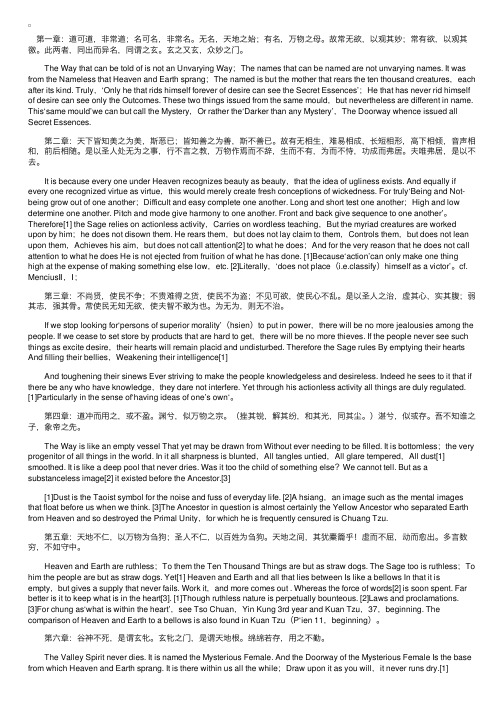
第⼀章:道可道,⾮常道;名可名,⾮常名。
⽆名,天地之始;有名,万物之母。
故常⽆欲,以观其妙;常有欲,以观其徼。
此两者,同出⽽异名,同谓之⽞。
⽞之⼜⽞,众妙之门。
The Way that can be told of is not an Unvarying Way;The names that can be named are not unvarying names. It was from the Nameless that Heaven and Earth sprang;The named is but the mother that rears the ten thousand creatures,each after its kind. Truly,‘Only he that rids himself forever of desire can see the Secret Essences’;He that has never rid himself of desire can see only the Outcomes. These two things issued from the same mould,but nevertheless are different in name. This‘same mould’we can but call the Mystery,Or rather the‘Darker than any Mystery’,The Doorway whence issued all Secret Essences. 第⼆章:天下皆知美之为美,斯恶已;皆知善之为善,斯不善已。
故有⽆相⽣,难易相成,长短相形,⾼下相倾,⾳声相和,前后相随。
是以圣⼈处⽆为之事,⾏不⾔之教,万物作焉⽽不辞,⽣⽽不有,为⽽不恃,功成⽽弗居。
夫唯弗居,是以不去。
It is because every one under Heaven recognizes beauty as beauty,that the idea of ugliness exists. And equally if every one recognized virtue as virtue,this would merely create fresh conceptions of wickedness. For truly‘Being and Not-being grow out of one another;Difficult and easy complete one another. Long and short test one another;High and low determine one another. Pitch and mode give harmony to one another. Front and back give sequence to one another’。
《道德经》英文版
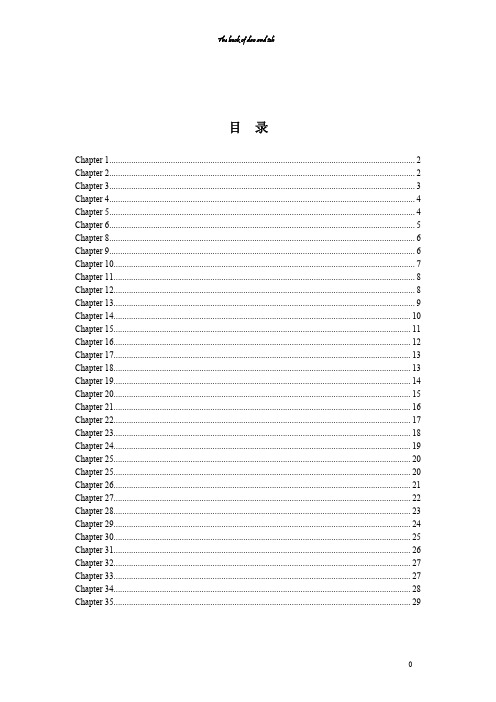
目录Chapter1 (2)Chapter2 (2)Chapter3 (3)Chapter4 (4)Chapter5 (4)Chapter6 (5)Chapter8 (6)Chapter9 (6)Chapter10 (7)Chapter11 (8)Chapter12 (8)Chapter13 (9)Chapter14 (10)Chapter15 (11)Chapter16 (12)Chapter17 (13)Chapter18 (13)Chapter19 (14)Chapter20 (15)Chapter21 (16)Chapter22 (17)Chapter23 (18)Chapter24 (19)Chapter25 (20)Chapter25 (20)Chapter26 (21)Chapter27 (22)Chapter28 (23)Chapter29 (24)Chapter30 (25)Chapter31 (26)Chapter32 (27)Chapter33 (27)Chapter34 (28)Chapter35 (29)Chapter11.The Tao that can be trodden is not the enduring and unchanging Tao.The name that can be named is not the enduring and unchanging name.2.(Conceived of as)having no name,it is the Originator of heaven and earth; (conceived of as)having a name,it is the Mother of all things.3.Always without desire we must be found,If its deep mystery we would sound;But if desire always within us be,Its outer fringe is all that we shall see.4.Under these two aspects,it is really the same;but as development takes place, it receives the different names.Together we call them the Mystery.Where the Mystery is the deepest is the gate of all that is subtle and wonderful.道可道,非常道;名可名,非常名。
道德经林语堂

道德经林语堂公司内部编号:(GOOD-TMMT-MMUT-UUPTY-UUYY-DTTI-【佛慧双语弘道馆】——《道德经》汉英对照(林语堂译本)道德经老子着林语堂英译一章道,可道,非恒道。
名,可名,非恒名。
无名,天地之始;有名,万物之母。
故常无欲,以观其妙;常有欲,以观其徼。
此两者同出而异名,同谓之玄。
玄之又玄,众妙之门。
The Tao that can be told ofIs not the Absolute Tao;The Names that can be givenAre not Absolute Names.The Nameless is the origin of Heaven and Earth;The Named is the Mother of All Things.Therefore:Oftentimes, one strips oneself of passionIn order to see the Secret of Life;Oftentimes, one regards life with passion,In order to see its manifest forms.These two (the Secret and its manifestations)Are (in their nature) the same;They are given different namesWhen they become manifest.They may both be called the Cosmic Mystery:Reaching from the Mystery into the Deeper MysteryIs the Gate to the Secret of All Life.--------------------------------------------------------------------------------二章天下皆知美之为美,斯恶已;皆知善之为善,斯不善矣。
道德经中英文对照版

第一章道可道,非常道。
名可名,非常名。
无名天地之始,有名万物之母。
故常无欲以观其妙;常有欲以观其徼〔jiào〕。
此两者同出而异名,同谓之玄,玄之又玄,众妙之门。
If you can talk about it,it ain't Tao.If it has a name,it's just another thing.Tao doesn't have a name.Names are for ordinary things.Stop wanting stuff;it keeps you from seeing what's real.When you want stuff,all you see are things.Those two sentencesmean the same thing.Figure them out,and you've got it made.第二章天下皆知美之为美,斯恶已。
皆知善之为善,斯不善已。
故有无相生,难易相成,长短相形,高低相倾,音声相和,前后相随。
是以圣人处无为之事,行不言之教;万物作焉而不辞,生而不有,为而不恃,功成而弗居。
夫唯弗居,是以不去。
If something looks beautiful to you,something else must be ugly.If something seems good,something else must seem bad.You can't havesomething without nothing.If no job is difficult,then no job is easy.Some things are up highbecause other things are down low.You know you're listening to musicbecause it doesn't sound like noise.All that came first,so this must be next.The Masters get the job donewithout moving a muscleand get their point acrosswithout saying a word.When things around them fall apart,they stay cool.They don't own much,but they use whatever's at hand.They do the workwithout expecting any favors.When they're done,they move on to the next job.That's why their work is so damn good.第三章不尚贤,使民不争;不贵难得之货,使民不为盗;不见〔xiàn〕可欲,使民心不乱。
道德经-英文版
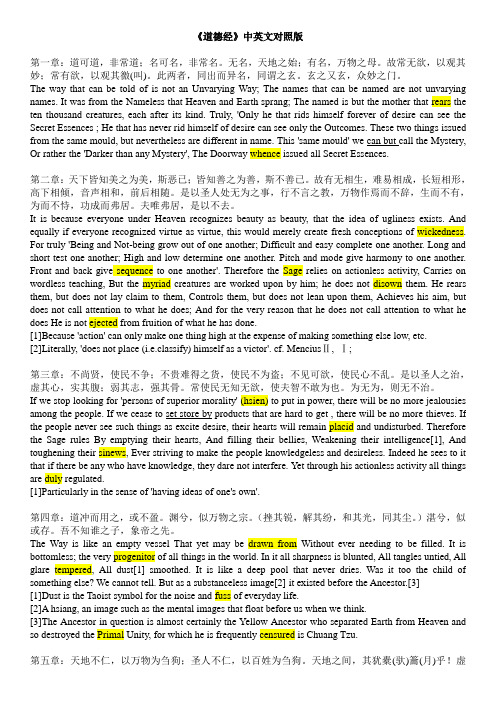
《道德经》中英文对照版第一章:道可道,非常道;名可名,非常名。
无名,天地之始;有名,万物之母。
故常无欲,以观其妙;常有欲,以观其徼(叫)。
此两者,同出而异名,同谓之玄。
玄之又玄,众妙之门。
The way that can be told of is not an Unvarying Way; The names that can be named are not unvarying names. It was from the Nameless that Heaven and Earth sprang; The named is but the mother that rears the ten thousand creatures, each after its kind. Truly, 'Only he that rids himself forever of desire can see the Secret Essences ; He that has never rid himself of desire can see only the Outcomes. These two things issued from the same mould, but nevertheless are different in name. This 'same mould' we can but call the Mystery, Or rather the 'Darker than any Mystery', The Doorway whence issued all Secret Essences.第二章:天下皆知美之为美,斯恶已;皆知善之为善,斯不善已。
故有无相生,难易相成,长短相形,高下相倾,音声相和,前后相随。
是以圣人处无为之事,行不言之教,万物作焉而不辞,生而不有,为而不恃,功成而弗居。
《道德经》汉英对照_(Legge_译本)
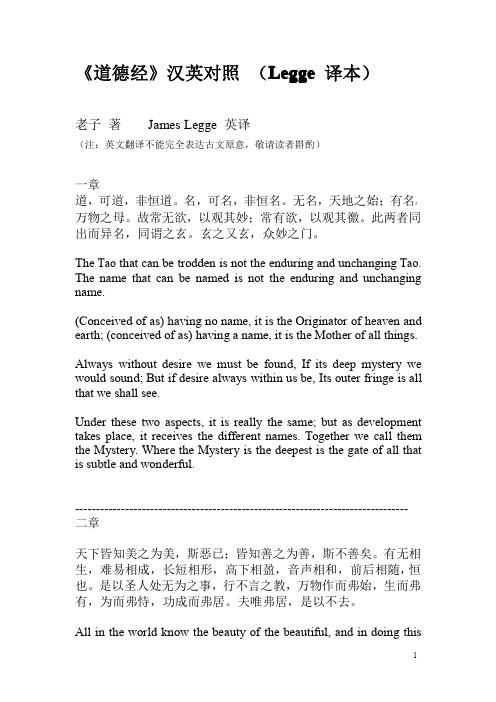
《道德经》汉英对照(Legge译本)老子著James Legge英译(注:英文翻译不能完全表达古文原意,敬请读者斟酌)一章道,可道,非恒道。
名,可名,非恒名。
无名,天地之始;有名,万物之母。
故常无欲,以观其妙;常有欲,以观其徼。
此两者同出而异名,同谓之玄。
玄之又玄,众妙之门。
The Tao that can be trodden is not the enduring and unchanging Tao. The name that can be named is not the enduring and unchanging name.(Conceived of as)having no name,it is the Originator of heaven and earth;(conceived of as)having a name,it is the Mother of all things. Always without desire we must be found,If its deep mystery we would sound;But if desire always within us be,Its outer fringe is all that we shall see.Under these two aspects,it is really the same;but as development takes place,it receives the different names.Together we call them the Mystery.Where the Mystery is the deepest is the gate of all that is subtle and wonderful.--------------------------------------------------------------------------------二章天下皆知美之为美,斯恶已;皆知善之为善,斯不善矣。
《道德经》 中英文对照版

《道德经》中英文对照版第一章道可道,非常道;名可名,非常名。
无名,天地之始;有名,万物之母。
故常无欲,以观其妙;常有欲,以观其徼。
此两者,同出而异名,同谓之玄。
玄之又玄,众妙之门。
Chapter 1The Way that can be told of is not an Unvarying Way;The names that can be named are not unvarying names.It was from the Nameless thatHeaven and Earth sprang;The named is but the mother that rears the ten thousand creatures, each after its kind.Truly, 'Only he that rids himself forever of desire can see the Secret Essences' ;He that has never rid himself of desire can see only the Outcomes.These two things issued from the same mould, but nevertheless are different in name.This ' same mould' we can but call the Mystery,Or rather the 'Darker than any Mystery',The Doorway whence issued all Secret Essences.第二章天下皆知美之为美,斯恶已;皆知善之为善,斯不善已。
故有无相生,难易相成,长短相形,高下相倾,音声相和,前后相随。
是以圣人处无为之事,行不言之教,万物作焉而不辞,生而不有,为而不恃,功成而弗居。
道德经中英文对照 国外学者
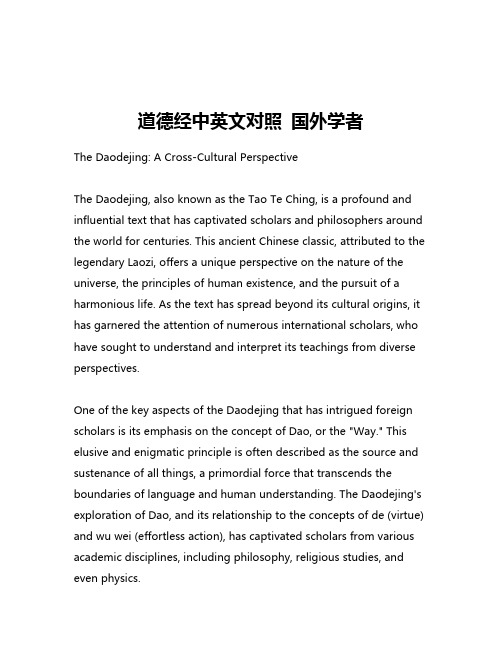
道德经中英文对照国外学者The Daodejing: A Cross-Cultural PerspectiveThe Daodejing, also known as the Tao Te Ching, is a profound and influential text that has captivated scholars and philosophers around the world for centuries. This ancient Chinese classic, attributed to the legendary Laozi, offers a unique perspective on the nature of the universe, the principles of human existence, and the pursuit of a harmonious life. As the text has spread beyond its cultural origins, it has garnered the attention of numerous international scholars, who have sought to understand and interpret its teachings from diverse perspectives.One of the key aspects of the Daodejing that has intrigued foreign scholars is its emphasis on the concept of Dao, or the "Way." This elusive and enigmatic principle is often described as the source and sustenance of all things, a primordial force that transcends the boundaries of language and human understanding. The Daodejing's exploration of Dao, and its relationship to the concepts of de (virtue) and wu wei (effortless action), has captivated scholars from various academic disciplines, including philosophy, religious studies, and even physics.Another aspect of the Daodejing that has captured the interest of international scholars is its unique approach to ethics and morality. Unlike many Western philosophical traditions that emphasize the importance of individual rights, the Daodejing advocates a more holistic and harmonious approach to human relationships and social order. The text's emphasis on humility, simplicity, and the cultivation of inner peace has resonated with scholars seeking alternative perspectives on ethical and political issues.One notable foreign scholar who has made significant contributions to the study of the Daodejing is the American philosopher and sinologist, Roger T. Ames. Ames has spent decades immersed in the study of Chinese philosophy and culture, and his interpretations of the Daodejing have been widely acclaimed for their depth and nuance. In his book "Dao De Jing: A Philosophical Translation," Ames presents a fresh and insightful translation of the text, accompanied by detailed commentaries that explore its philosophical and cultural implications.Ames' work has been particularly influential in challenging traditional Western interpretations of the Daodejing, which have often been colored by Eurocentric biases and assumptions. Instead, Ames' approach emphasizes the importance of understanding the text within its original cultural context, and of recognizing the uniqueworldview and conceptual framework that underpins its teachings.Another prominent foreign scholar who has made significant contributions to the study of the Daodejing is the French sinologist and philosopher, François Jullien. Jullien's work has been instrumental in highlighting the ways in which the Daodejing's teachings diverge from and challenge the foundational assumptions of Western philosophy. In his book "The Propensity of Things: Toward a History of Efficacy in China," Jullien explores the Daodejing's conception of "efficacy" and its implications for understanding the nature of power, action, and human agency.Jullien's analysis of the Daodejing's unique perspective on these issues has been particularly influential in the fields of political theory and international relations, where his work has been used to challenge dominant Western models of power and governance. By highlighting the Daodejing's emphasis on the importance of adaptability, responsiveness, and the cultivation of inner harmony, Jullien has offered alternative frameworks for understanding and navigating the complexities of the modern world.In addition to these prominent scholars, the Daodejing has also attracted the attention of a diverse range of international thinkers, from scientists and artists to religious leaders and social activists. Each of these individuals has brought their own unique perspectiveand expertise to the study of this ancient text, contributing to a rich and multifaceted understanding of its teachings.One example of this cross-cultural engagement with the Daodejing is the work of the American physicist and philosopher, Fritjof Capra. In his book "The Tao of Physics," Capra explores the parallels between the philosophical principles of the Daodejing and the insights of modern quantum physics, highlighting the ways in which both traditions share a fundamental understanding of the interconnectedness and dynamism of the natural world.Similarly, the Daodejing has also been the subject of numerous artistic interpretations and creative adaptations, as artists and writers from around the world have sought to capture the essence of its teachings through various mediums. From poetry and calligraphy to visual art and music, the Daodejing has inspired a rich tapestry of creative expression that reflects the text's enduring relevance and universal appeal.In conclusion, the Daodejing's influence on international scholarship and intellectual discourse is a testament to the depth and complexity of its teachings. As scholars from diverse backgrounds continue to engage with this ancient text, they are not only deepening our understanding of its philosophical and cultural significance but also contributing to a broader dialogue on the nature of human existence,the principles of ethical and political organization, and the pursuit of a harmonious relationship with the natural world. By embracing the Daodejing's unique perspective and engaging in cross-cultural exchange, these scholars are helping to expand the horizons of human knowledge and understanding, and to forge new pathways towards a more just and sustainable future.。
道德经 三十章

道德经三十章(中英文版)Title: Chapter 30 of the Tao Te ChingThe Tao Te Ching, a classic text of Chinese philosophy, is filled with profound wisdom.One of the most intriguing chapters is Chapter 30, which discusses the importance ofnon-action and the value of Emptiness.道德经是中国哲学经典之一,充满了深刻的智慧。
其中最引人入胜的一章是第30章,它讨论了非行动的重要性以及空无的价值。
In this chapter, Laozi emphasizes the power ofnon-action, or "wu wei," in achieving success and harmony.He states, "Nondoing is the way of the Tao." This concept may seem counterintuitive, as our society often rewards action and productivity.However, Laozi argues that by letting go of desires and not forcing outcomes, we can find balance and fulfillment.在这章中,老子强调了非行动的力量,或者说“无为”,以达到成功和和谐。
他写道:“无为而治。
”这个概念可能看起来与我们社会的直觉相悖,我们的社会常常奖励行动和生产力。
然而,老子认为,通过放下欲望和不强求结果,我们可以找到平衡和满足。
Another key idea in Chapter 30 is the value of ozi writes, "Emptiness is the essence of the Tao." He explains that Emptiness is not merely a lack of content, but a state of potential and openness.It is through Emptiness that things can arise and flourish.第30章中的另一个关键思想是空无的价值。
道德经中英文对照版

道德经中英文对照版
摘要:
I.引言
- 介绍道德经
- 提出现有道德经中英文对照版的主题
II.道德经的概述
- 解释道德经的来源
- 介绍道德经的主要内容
- 概括道德经的核心思想
III.道德经中英文对照版的特点
- 比较道德经中英文对照版与原文的差异
- 分析道德经中英文对照版的优点
- 阐述道德经中英文对照版对于学习道德经的重要性
IV.总结
- 总结道德经中英文对照版的作用
- 强调学习道德经的重要性
正文:
I.引言
道德经是古代中国哲学家老子所著的一部哲学经典,被誉为道家学派的创始之作。
- 1、下载文档前请自行甄别文档内容的完整性,平台不提供额外的编辑、内容补充、找答案等附加服务。
- 2、"仅部分预览"的文档,不可在线预览部分如存在完整性等问题,可反馈申请退款(可完整预览的文档不适用该条件!)。
- 3、如文档侵犯您的权益,请联系客服反馈,我们会尽快为您处理(人工客服工作时间:9:00-18:30)。
第一章:道可道,非常道;名可名,非常名。
无名,天地之始;有名,万物之母。
故常无欲,以观其妙;常有欲,以观其徼。
此两者,同出而异名,同谓之玄。
玄之又玄,众妙之门。
The Way that can be told of is not an Unvarying Way; The names that can be named are not unvarying names. It was from the Nameless that Heaven and Earth sprang; The named is but the mother that rears the ten thousand creatures, each after its kind. Truly, 'Only he that rids himself forever of desire can see the Secret Essences' ; He that has never rid himself of desire can see only the Outcomes. These two things issued from the same mould, but nevertheless are different in name. This ' same mould' we can but call the Mystery, Or rather the 'Darker than any Mystery', The Doorway whence issued all Secret Essences.第二章:天下皆知美之为美,斯恶已;皆知善之为善,斯不善已。
故有无相生,难易相成,长短相形,高下相倾,音声相和,前后相随。
是以圣人处无为之事,行不言之教,万物作焉而不辞,生而不有,为而不恃,功成而弗居。
夫唯弗居,是以不去。
It is because every one under Heaven recognizes beauty as beauty,that the idea of ugliness exists. And equally if every one recognized virtue as virtue, this would merely create fresh conceptions of wickedness. For truly 'Being and Not-being grow out of one another; Difficult and easy complete one another. Long and short test one another; High and low determine one another. Pitch and mode give harmony to one another. Front and back give sequence to one another'. Therefore[1] the Sage relies on actionless activity, Carries on wordless teaching, But the myriad creatures are worked upon by him; he does not disown them. He rears them, but does not lay claim to them, Controls them, but does not lean upon them, Achieves his aim, but does not call attention[2] to what he does; And for the very reason that he does not call attention to what he does He is not ejected from fruition of what he has done.[1]Because 'action' can only make one thing high at the expense of making something else low, etc.[2]Literally, 'does not place (i.e.classify) himself as a victor'. cf. MenciusⅡ, Ⅰ;第三章:不尚贤,使民不争;不贵难得之货,使民不为盗;不见可欲,使民心不乱。
是以圣人之治,虚其心,实其腹;弱其志,强其骨。
常使民无知无欲,使夫智不敢为也。
为无为,则无不治。
If we stop looking for 'persons of superior morality' (hsien) to put in power, there will be no more jealousies among the people. If we cease to set store by products that are hard to get , there will be no more thieves. If the people never see such things as excite desire, their hearts will remain placid and undisturbed. Therefore the Sage rulesBy emptying their heartsAnd filling their bellies,Weakening their intelligence[1]And toughening their sinewsEver striving to make the people knowledgeless and desireless.Indeed he sees to it that if there be any who have knowledge, they dare not interfere. Yet through his actionless activity all things are duly regulated.[1]Particularly in the sense of 'having ideas of one's own'.第四章:道冲而用之,或不盈。
渊兮,似万物之宗。
(挫其锐,解其纷,和其光,同其尘。
)湛兮,似或存。
吾不知谁之子,象帝之先。
The Way is like an empty vessel That yet may be drawn from Without ever needing to be filled. It is bottomless; the very progenitor of all things in the world. In it all sharpness is blunted, All tangles untied, All glare tempered, All dust[1] smoothed. It is like a deep pool that never dries. Was it too the child of something else? We cannot tell. But as a substanceless image[2] it existed before the Ancestor.[3][1]Dust is the Taoist symbol for the noise and fuss of everyday life.[2]A hsiang, an image such as the mental images that float before us when we think.[3]The Ancestor in question is almost certainly the Yellow Ancestor who separated Earth from Heaven and so destroyed the Primal Unity, for which he is frequently censured is Chuang Tzu.第五章:天地不仁,以万物为刍狗;圣人不仁,以百姓为刍狗。
天地之间,其犹橐籥乎!虚而不屈,动而愈出。
多言数穷,不如守中。
Heaven and Earth are ruthless; To them the Ten Thousand Things are but as straw dogs. The Sage too is ruthless; To him the people are but as straw dogs. Yet[1] Heaven and Earth and all that lies between Is like a bellows In that it is empty, but gives a supply that never fails. Work it, and more comes out . Whereas the force of words[2] is soon spent. Far better is it to keep what is in the heart[3].[1]Though ruthless nature is perpetually bounteous.[2]Laws and proclamations.[3]For chung as 'what is within the heart', see Tso Chuan, Yin Kung 3rd year and Kuan Tzu,37, beginning. The comparison of Heaven and Earth to a bellows is also found in Kuan Tzu (P'ien 11, beginning). 第六章:谷神不死,是谓玄牝。
玄牝之门,是谓天地根。
绵绵若存,用之不勤。
The Valley Spirit never dies. It is named the Mysterious Female. And the Doorway of the Mysterious Female Is the base from which Heaven and Earth sprang. It is there within us all the while; Draw upon it as you will, it never runs dry.[1][1]Lieh Tzu quotes these lines as coming from the Book of the Yellow Ancestor; but it does not follow that the Tao Ching is actually quothing them from this source. They may belong to the general stock of early Taoist rhymed teaching. For ch' in compare below, Chapter 52, line 9, and Huai-nan Tzu I, fol.2.第七章:天长地久,天地所以能长且久者,以其不自生,故能长生。
